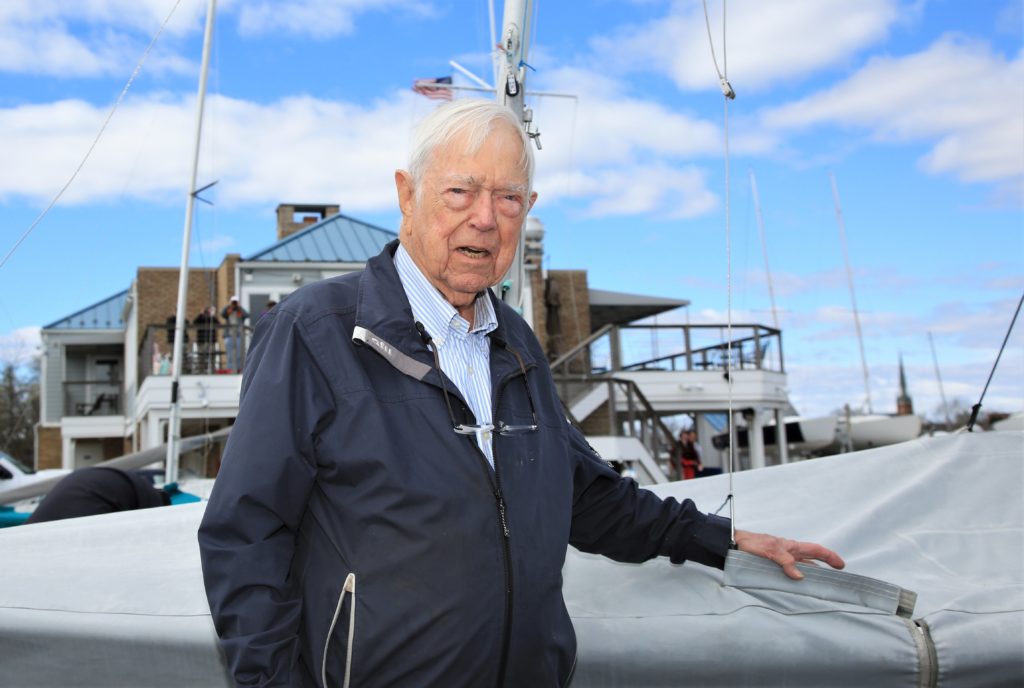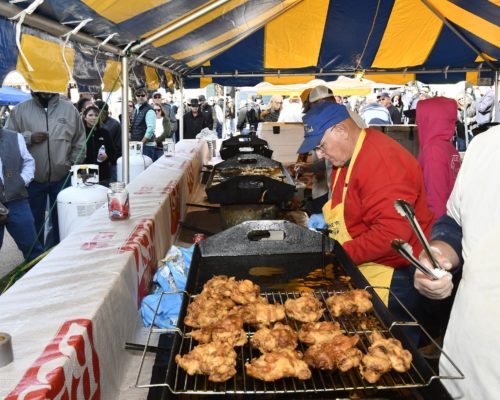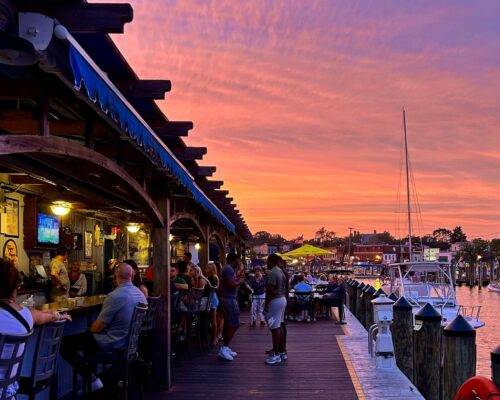The Annapolis sailing community celebrated a significant milestone in March when one of its most influential and longstanding members, Dick C. Bartlett, turned 100 years old. Bartlett, who is known affectionately as Dick C., was one of the original members of the Severn Sailing Association when it opened, and has maintained that membership for the last 70 years. His dedication to the sport has influenced countless sailors, from Opti novices to America’s Cup skippers.
Bartlett’s own sailing education began at home on the Severn River, when his father (a Navy engineer) decided that if he wanted to find the right boat, he’d have to build it in his basement.
“We had two National One-Designs that my father built, but we needed something smaller that could be launched from the beach,” Bartlett says. “He built a 17-foot sailboat and called it the Severn One-Design, and we sailed those all summer. I think he built five of those in the basement of the minister’s house.”
Bartlett Sr. had the right idea, because weekend regattas quickly became a mainstay. “My father built boats because he wanted us to have something to do, and soon enough you might have 25-30 boats out on a Sunday afternoon.” Comets, Snipes, National ODs and Severn ODs, Penguins, and even a few prototypes would crowd the entrance to Round Bay, with parents and children competing against each other.
Bartlett graduated from Annapolis High School in 1940 and was immediately called to war. He signed up for Navy flight school and learned to fly the Kingsfisher, a seaplane that carried a radioman in the back and pilot in the front. Kingfishers were launched by catapult from aircraft carriers with water landings made possible due to a large float that spanned the length of the plane.
“The Navy used the Kingfisher to scout targets,” he says. “They’d catapult us off the battleship, and off we’d go, then come back in a while.” Bartlett was sent to San Diego for more training before ending up in the Aleutian Islands, where he flew the Kingfisher out of Adak Navy Base. Bartlett spent the majority of WWII over the Bering Sea before coming home to California, where he had a young family waiting for him and more sailing to do.
“Dad and I got a Snipe when we lived in California,” says Linda Bartlett, the eldest of Bartlett’s three surviving children (son Richard C. Bartlett III passed at age 19 of Muscular Dystrophy). “It was usually that I skippered and Dad crewed because he wanted me to get as much experience as I could skippering a boat.”
If having a Navy pilot as crew seems intimidating, Linda says otherwise. “Dad was always even-keeled and gentle, but extremely disciplined. When I would get upset, he’d just say, ‘Don’t worry about it, just get better for next time.’”
After a stint in the Korean War flying AD Skyraiders, Dick C. moved his family back to the Annapolis area, just as Bartlett Sr. and a group of about 30 neighbors were busy putting together a sailing club in downtown Annapolis. Three small cottages at the end of First Street in the Eastport neighborhood of Annapolis had come on the market, and a group of Round Bay residents went to work to get the space re-zoned for a sailing club. The Bartlett children graduated from SSA’s youth sailing program, and Dick C. and other Club members volunteered to help expand the club by setting bulkheads and filling them with dredge material.
“Being in a career where you’ve gone to war not once but twice, my dad didn’t get to be home a whole lot,” says Jonathan Bartlett, his son. “So when we moved back to Annapolis, he knew it was going to be his last appointment before he retired, and he wanted to spend his time at SSA and do something with his children.”
“He always said that if you wanted to learn to sail, you got into a small boat,” says Linda. “By the time he retired, he wanted to sail with his children. It was easier to do it in a small boat, but it’s also true that the best sailors out there are small boat sailors.”
Dick C. made sure his daughters had every opportunity the boys had. Linda went on to become the first female skipper in both the Annapolis to Newport and Newport to Bermuda Races. “Our father inspired us to achieve whatever is possible,” she says. “If you want to go out and do it, just go out and do it. Don’t listen to anyone who tells you it can’t happen.”
As a fellow competitor, Dick C. was there to have fun. “My father’s very mild mannered,” says his son. “He doesn’t get wound up, and I can understand why. This is a man who used to be catapulted into the air, scout enemy movements, and then land his plane on the water before being picked up by a single point lift. He’s as even-keeled as they come.”
Bartlett’s younger daughter, Robin, wasn’t bit by the racing bug, however. “He thought I’d like racing, but I’m just not a competitive person,” she says. “So he got me a Sunfish because he knew I liked to sail, and that way I could enjoy sailing and have fun without racing.”
“I just encouraged them,” Dick C. says when he’s asked about how he raised three happy, successful sailors. “A lot of times they didn’t know if they liked sailing, but I just kept encouraging them.”
Bartlett’s strategy worked outside his family, too. Eric Purdon, who joined SSA in 1968 and started sailing in the Snipe fleet, formed a strong relationship with Dick C. from the very start. “I remember how encouraging he was to me and other sailors in the back of the fleet,” he recalls. “As an organizer, Dick C. was a large reason the regattas went off without a hitch, and a large part of my sailing successes are due to his encouragement in my early sailing days.”
“Dick C.’s presence at every SSA annual meeting speaks volumes about how much he cares about the club,” says Ted Morgan, past Commodore of SSA. “He instilled in me (and so many others) a strong desire to keep SSA grounded and consistently focused on the Club’s mission to promote one-design sailing, especially junior sailing, and to make it a heck of a lot of fun by hosting social activities for sailors.”
Nowadays, Dick C. is enjoying a somewhat slower pace. “I try to stay busy,” he says, admitting that the first few months of the pandemic were challenging because he was kept in the house constantly. “But I’ve seen too many things over the years to worry about something like that. It’s like the stock market: it goes up, it goes down, and you can’t worry about it.”
So what is it like to celebrate your 100th birthday? “There isn’t any real ‘best part,’” he says. “But I’m still alive, and I can still do everything. Thanks to my aviator eyes, I can still drive night or day.”
“He’s the kindest, most optimistic person I know,” says Linda. “To have him as a dad has been a benefit to me more than I can even say. And to have him as long as I’ve had him is remarkable.”
-Duffy Perkins



